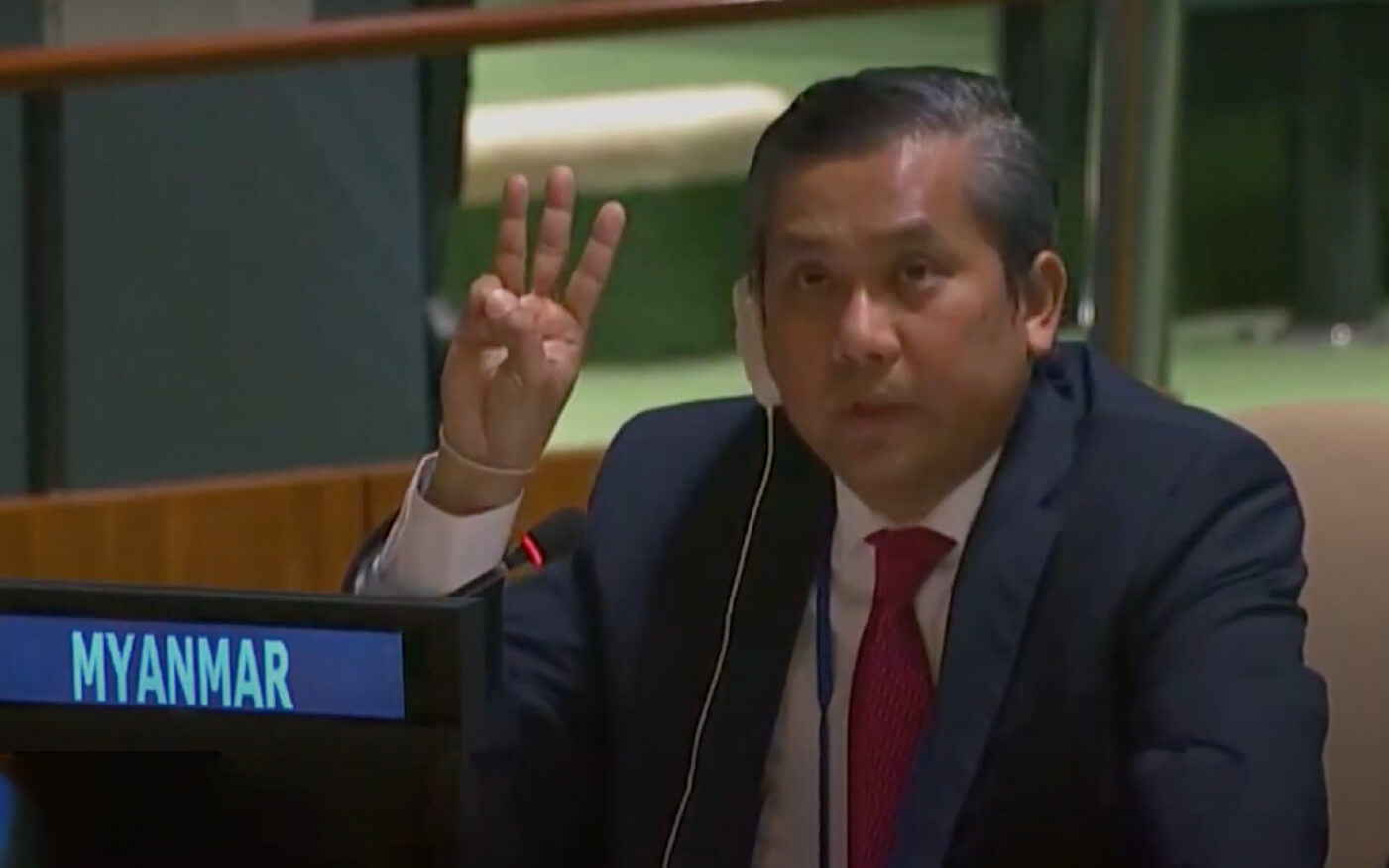U.N. Member States: Recognize Credentials of Myanmar Representative Kyaw Moe Tun

General Assembly expected to determine Myanmar representation at U.N. tomorrow
(BANGKOK, August 13, 2021)—United Nations member states should recognize the credentials of the serving Permanent Representative of Myanmar to the U.N., Ambassador Kyaw Moe Tun, during the 76th session of the U.N. General Assembly, Fortify Rights said today. U.N. member states convene tomorrow in New York for the annual General Assembly.
“The Myanmar junta is an unlawful, criminal, and terrorizing enterprise that should have no place within the halls of the U.N.,” said Matthew Smith, CEO at Fortify Rights. “Member states should support the credentials of Ambassador Kyaw Moe Tun.”
Fortify Rights and 357 Myanmar and international civil society organizations today published an open letter to all U.N. member states’ permanent representatives urging them to accept Ambassador Kyaw Moe Tun’s credentials, which empower him to attend and speak within the U.N. as Myanmar’s representative. Myanmar’s military junta is expected to seek U.N. credentials for an opposing representative, sparking a dispute that could be settled, for the time being, on procedural grounds by the General Assembly’s Credentials Committee.
The Credentials Committee is appointed by the General Assembly on the first day of the session. The committee comprises representatives of nine U.N. member states proposed by the president of the General Assembly. It has become well-established practice that the U.S., Russia, and China all take seats on the committee, and the remaining six members are selected on the basis of equitable geographic coverage. The committee is mandated to examine credentials of proposed representatives of member states and report to the General Assembly on its findings.
Prior to the February 1 military coup d’état in Myanmar, Ambassador Kyaw Moe Tun served as Myanmar’s Permanent Representative to the U.N. and, at the time of writing, retains his credentials. In a speech to the General Assembly on February 26, Ambassador Kyaw Moe Tun denounced the coup d’état and called on member states to use “the strongest possible action . . . to immediately end the military coup, to stop oppressing the innocent people, to return the state power to the people, and to restore the democracy.”
On April 16, elected legislators in Myanmar formed the National Unity Government (NUG) to represent the sovereign will of the people of Myanmar. Ambassador Kyaw Moe Tun has pledged allegiance to the NUG.
The NUG has taken important steps to address past and present atrocity crimes and human rights violations in Myanmar. On August 19, the NUG announced it had delegated jurisdiction to the International Criminal Court to investigate and prosecute atrocities dating back to 2002. It also acknowledged the rights of the Rohingya ethnic minority and atrocity crimes they faced at the hands of the military, which Fortify Rights, a U.N. fact-finding mission, and others have identified as genocide.
Since seizing power, the Myanmar military junta has killed more than 1,000 women, men, and children and arbitrarily arrested, detained, and charged more than 8,000 people in a widespread and systematic attack against the civilian population.
The U.N. General Assembly issued a resolution on June 25 that “strongly condemned” the use of lethal force against peaceful protesters and, in a rare move, called for a global arms embargo against the Myanmar military. The resolution received widespread international support, with 119 member states voting in favor of it and only one, Belarus, voting against it.
When dealing with past disputes, the Credentials Committee has either voted for one party over the other or has deferred their decision, leaving the incumbent Permanent Representative provisionally in place.
No authoritative rules or guidance have been developed to assist the credentials committee to decide between rival claims for credentials; however, a General Assembly resolution from 1950 states:
[W]henever more than one authority claims to be the government entitled to represent a Member State in the United Nations and this question becomes the subject of controversy in the United Nations, the question should be considered in the light of the Purposes and Principles of the Charter and the circumstances of each case.
Article 1(3) of the U.N. Charter notes that the purposes of the global body include “promoting and encouraging respect for human rights and for fundamental freedoms for all.” Further, the Universal Declaration of Human Rights notes in Article 21(3) that “The will of the people shall be the basis of the authority of government.”
“Member states should urgently support the NUG and the people of Myanmar in their efforts to hold the junta accountable for its crimes,” said Matthew Smith. “The international community is failing the people of Myanmar and should do everything now to correct course.”


